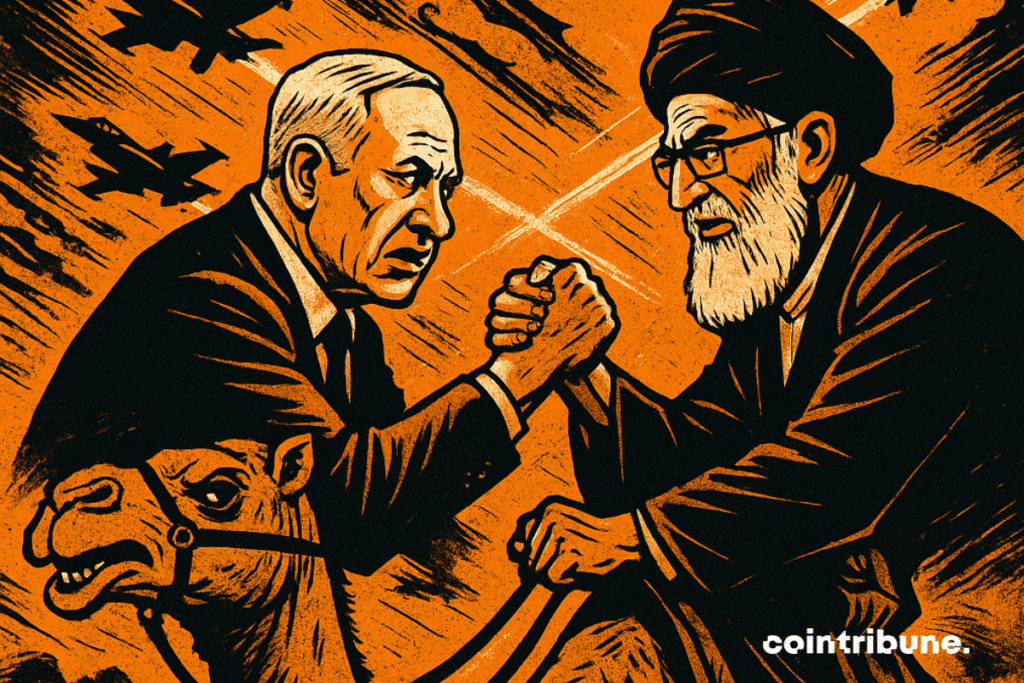Iran-Israel: On the Brink of Total War?
June 13, 2025, marks a turning point in the Iran-Israel conflict. Massive Israeli strikes targeted the core of Iran’s military apparatus. Iran retaliated that very evening with 300 ballistic missiles, crossing a new threshold in this long-standing war.

In Brief
- Israel launched its most destructive strikes against Iran since the start of the conflict in April 2024.
- 300 ballistic missiles fired at Israel demonstrate that Tehran retains military capabilities.
- The escalation could lead to Russian intervention and upset the regional balance.
The War Intensifies
This escalation is part of a conflict that began in April 2024. The Israeli attack on the Iranian consulate in Damascus broke a historical taboo. Since then, strikes have occurred in increasing intensity.
Historians will likely date the start of the Iran-Israel war to this strike on Damascus. Thus, the bombings in April and October 2024 were setting the stage for the offensive on June 13, 2025.
The recent Israeli strikes surpass anything seen before. Consequently, Israel simultaneously targeted nuclear facilities, air defense capabilities, and the Iranian military hierarchy. The Islamic Revolutionary Guard Corps, a pillar of the regime, suffered significant losses.
Iran Weakened by This War, but Not Yet Defeated
Israeli air superiority seemed total during the day of June 13. Israeli drones flew over the Tabriz region without being challenged. Iranian air defenses appeared neutralized by cyberattacks and massive electronic jamming.
However, the Iranian evening counterattack surprised by its scale. Three waves totaling 300 ballistic missiles breached Israeli defenses. This striking capability demonstrates that Iran retains significant military means.
Mossad infiltration in Iran has reached impressive levels. Israeli agents operate from within Iranian territory. This penetration is reminiscent of what Ukraine inflicts on Russia, but on a larger scale.
An Iranian Regime at the End of Its Cycle
The mullahs’ regime presents all the characteristics of an aging old regime. Like Germany before 1914 or the USSR before 1991, it suffers from growing internal tensions. Youth protests in cities bear witness to this gradual delegitimization.
However, the Revolutionary Guard Corps maintains internal order. As long as this ideological military apparatus remains intact, the regime can survive. Moreover, Iran has lost its main regional allies with Assad’s fall in Syria and Hezbollah’s weakening.
Geography is against Iran. Unlike nuclear-armed Russia or continental China, Iran remains vulnerable to conventional strikes. This weakness makes it a priority target for the West in their confrontation with the Eurasian bloc.
Iran, the Weak Link in the Russo-Chinese Bloc
Iran is the weak link in the Russia-China-Iran bloc facing the West. Striking Tehran indirectly weakens Moscow and Beijing. Thus, Iran has announced the suspension of its drone deliveries to Russia for its own military needs.
Oil prices are soaring mechanically with this escalation. Paradoxically, this rise benefits Vladimir Putin more than it harms him. Oil revenues largely compensate for the loss of Iranian weapons to fund the war in Ukraine.
For China, Iranian instability threatens its investments in the China-Pakistan corridor. Beijing counts on Iran to secure its energy supply. Therefore, an indirect Chinese intervention is not to be excluded if the Iranian regime collapsed.
Towards Regional Conflagration Following the War?
Russia cannot afford to see the mullahs’ regime fall. Hence, a Russian intervention in the form of paramilitaries like Wagner remains possible.
Erdogan’s Turkey is rubbing its hands over this situation. Ankara seeks to restore its influence over the former Ottoman space. Iran’s weakening opens the way for Turkish expansion towards Iraq and Central Asia.
This Iran-Israel war goes beyond the regional framework to become a global confrontation issue. It effectively pits the Eurasian bloc against Western powers. Furthermore, the outcome of this conflict will determine the balance of power in the Middle East for decades to come.
Will the Iranian regime survive this test of strength? Its ability to respond demonstrates unexpected resilience. Nevertheless, continuing Israeli strikes during the announced fifteen days could definitively drain its military capacities. The future of the entire region is at stake in this unprecedented escalation, and the possibility of a third world war.
Maximize your Cointribune experience with our "Read to Earn" program! For every article you read, earn points and access exclusive rewards. Sign up now and start earning benefits.

Chaque jour, j’essaie d’enrichir mes connaissances sur cette révolution qui permettra à l’humanité d’avancer dans sa conquête de liberté.
The views, thoughts, and opinions expressed in this article belong solely to the author, and should not be taken as investment advice. Do your own research before taking any investment decisions.